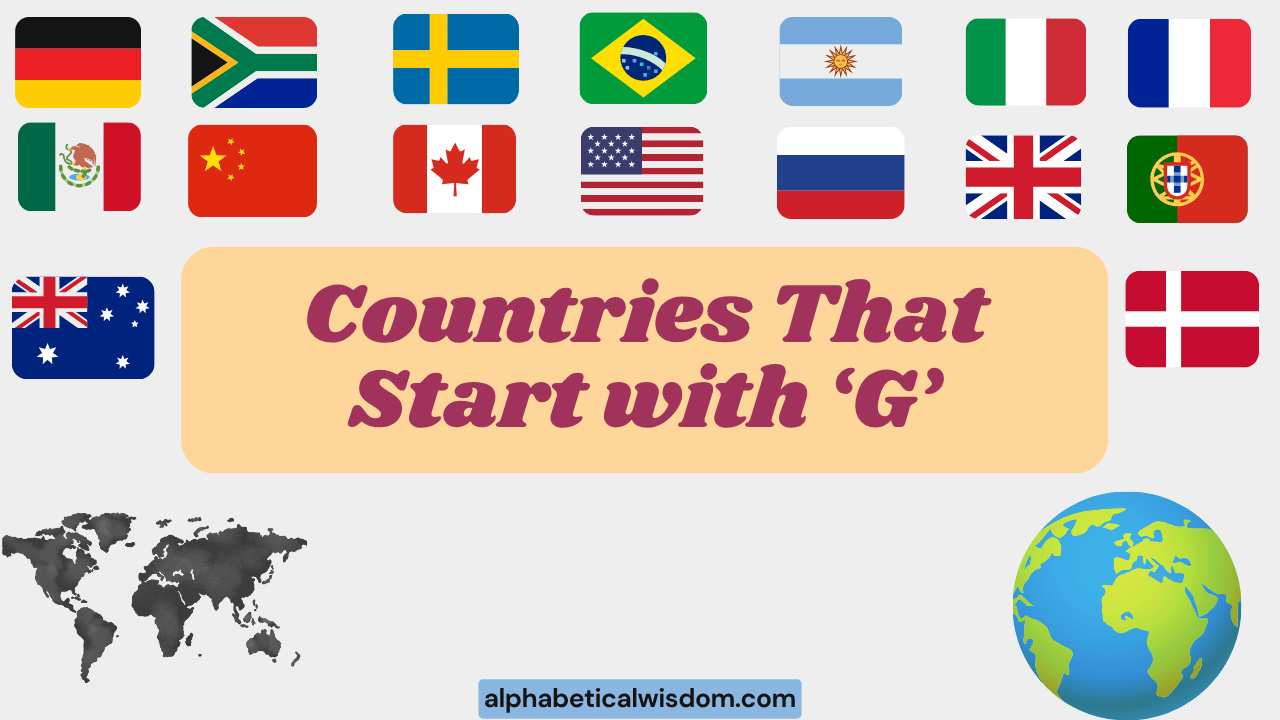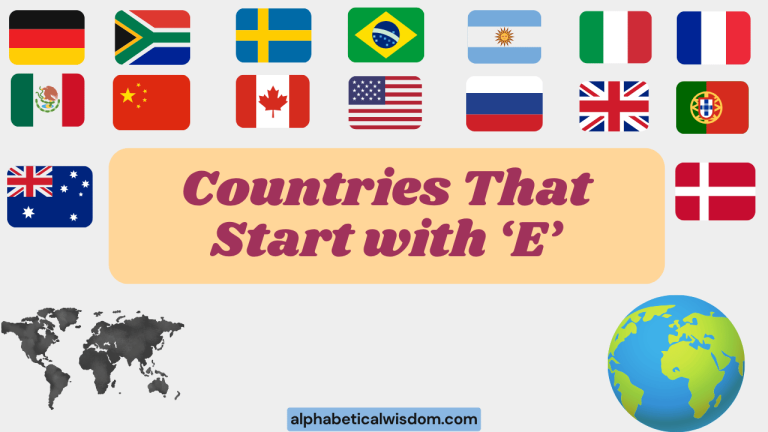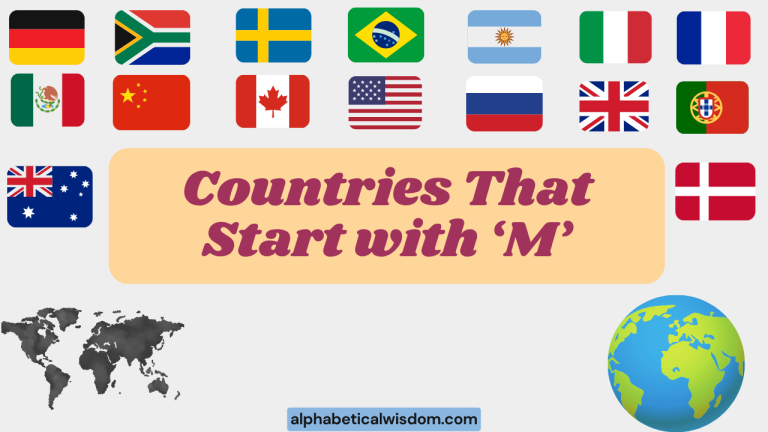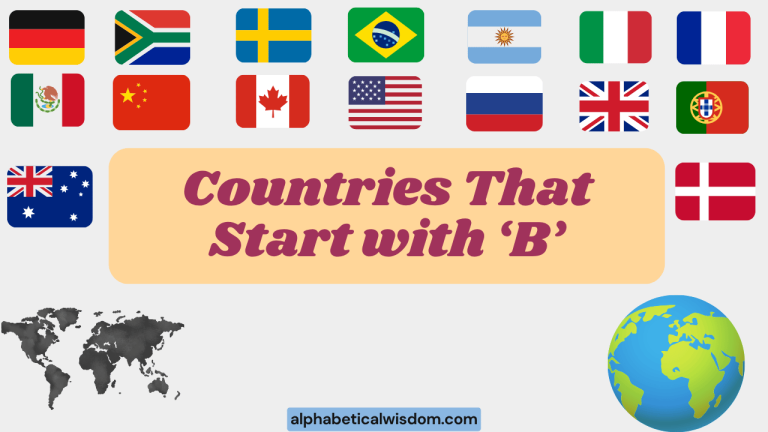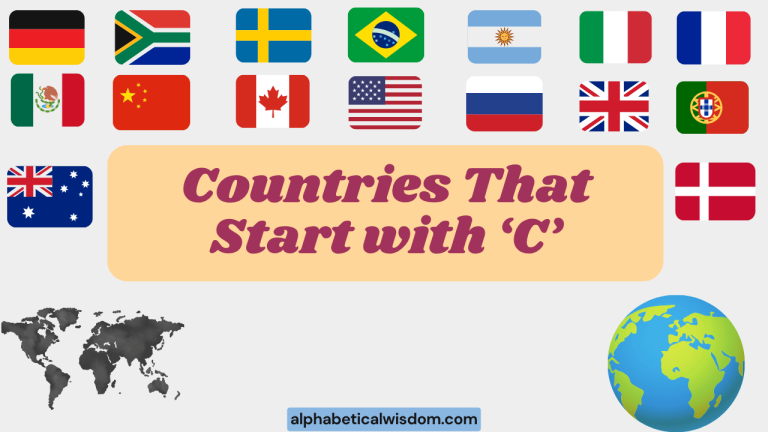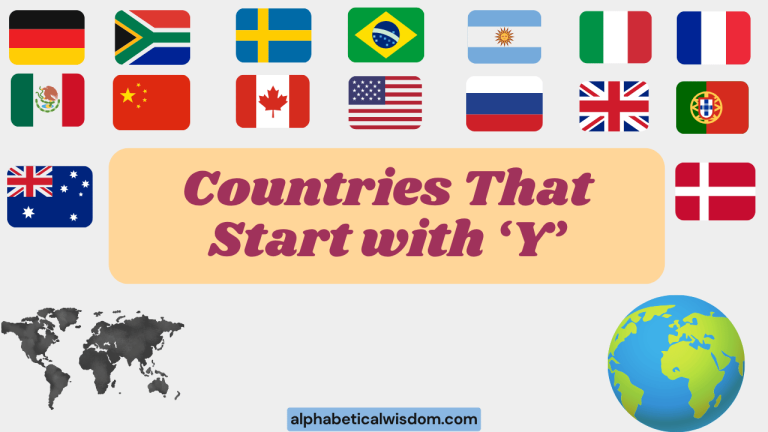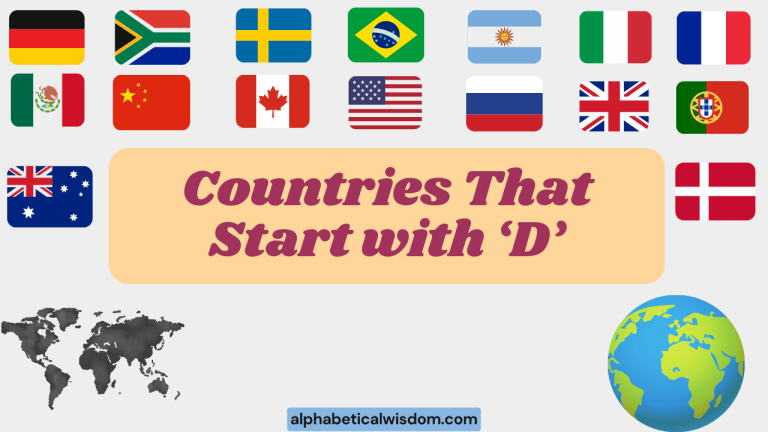Countries Starting With G: A Grammatical Exploration
Understanding how to use country names correctly in English is crucial for clear and effective communication. This article focuses on countries that start with the letter “G,” providing a comprehensive guide to their grammatical usage.
Whether you’re an English language learner, a teacher, or simply someone looking to improve their grammar skills, this guide will help you confidently use these country names in various contexts.
Table of Contents
- Introduction
- Definition: Countries Starting with G
- Structural Breakdown
- Types or Categories
- Examples
- Usage Rules
- Common Mistakes
- Practice Exercises
- Advanced Topics
- FAQ
- Conclusion
Definition: Countries Starting with G
A country is a self-governed political entity, often associated with a specific territory and population. When we talk about countries starting with the letter “G,” we are referring to those sovereign nations whose names begin with this letter. These names function as proper nouns in English grammar, requiring specific rules for capitalization and usage.
The primary function of a country name is to identify a specific geographical and political entity. They are used in a wide range of contexts, from everyday conversation to formal academic writing, and understanding their correct grammatical usage is essential for clear and accurate communication.
Furthermore, the names of countries often have adjectival forms and are used in compound nouns, adding to the complexity of their grammatical application.
Contextually, country names are used in discussions about geography, politics, economics, culture, and history. They are also essential in international relations, trade, travel, and news reporting.
For example, when discussing international trade agreements, it is crucial to correctly identify the participating countries. Similarly, in travel writing, accurate use of country names enhances the clarity and credibility of the narrative.
The correct use of these names demonstrates respect for the cultures and identities they represent.
Structural Breakdown
The structure of sentences involving country names starting with “G” typically follows standard English sentence structure. The country name can function as the subject, object, or complement in a sentence.
Understanding these roles is vital for constructing grammatically correct sentences. The following examples illustrate the different roles country names can play:
- Subject: Germany is a major economic power.
- Object: I visited Greece last summer.
- Complement: He is from Georgia.
Furthermore, the adjectival forms of these country names are often used to modify nouns. For example, “German cars” or “Greek food.” These adjectival forms typically precede the noun they modify.
The possessive form, which is created by adding an apostrophe and an “s” (‘s), indicates ownership or association. For instance, “Germany’s economy” or “Greece’s history.” These structural elements contribute to the overall grammatical correctness and clarity of sentences involving country names.
Sentences can also include prepositional phrases that specify location or origin, such as “in Germany” or “from Greece.” These phrases add detail and context to the sentence, providing information about where something is located or where someone comes from. The correct choice of preposition is crucial for conveying the intended meaning accurately.
For example, “I live in Ghana” indicates residence, while “I am traveling to Ghana” indicates destination.
Types or Categories
Geographical Location
Countries beginning with “G” are located in diverse geographical regions across the globe. This geographical diversity influences their climate, culture, and economy.
Understanding their location helps contextualize their role in global affairs.
For example, Germany is located in Central Europe and is known for its industrial prowess and cultural heritage. Greece is in Southeastern Europe, famous for its ancient history and Mediterranean climate. Georgia is situated at the intersection of Europe and Asia, with a rich history and diverse landscape. Ghana is in West Africa, known for its cocoa production and vibrant culture. Grenada, an island nation in the Caribbean, attracts tourists with its beautiful beaches and spice production. Guatemala, in Central America, boasts ancient Mayan ruins and diverse ecosystems. Guinea, in West Africa, is rich in natural resources. Guyana, on the northern coast of South America, is known for its rainforests and biodiversity.
Political Structure
The political structures of countries starting with “G” vary, ranging from republics to monarchies. This diversity impacts their governance, laws, and international relations.
Understanding their political systems is crucial for comprehending their policies and interactions with other nations.
Germany is a federal parliamentary republic, characterized by a strong emphasis on democracy and social welfare. Greece is a parliamentary republic with a president as head of state and a prime minister as head of government. Georgia is a semi-presidential republic, balancing presidential and parliamentary powers. Ghana is a presidential republic, where the president is both head of state and head of government. Grenada is a parliamentary democracy within the Commonwealth, with a governor-general representing the British monarch. Guatemala is a constitutional republic, with a president elected by popular vote. Guinea has experienced various political transitions, currently operating under a transitional government. Guyana is a semi-presidential republic, blending presidential and parliamentary systems.
Examples
General Usage
The following table provides examples of how country names starting with “G” are used in general sentences. These examples illustrate their function as subjects, objects, and complements within a sentence.
| Country | Example Sentence |
|---|---|
| Germany | Germany is famous for its beer and sausages. |
| Germany | I plan to visit Germany next year. |
| Germany | The car was made in Germany. |
| Greece | Greece is the birthplace of democracy. |
| Greece | She studied ancient history in Greece. |
| Greece | My dream vacation is to go to Greece. |
| Georgia | Georgia is known for its wine and hospitality. |
| Georgia | He traveled to Georgia for a business meeting. |
| Georgia | The mountains in Georgia are breathtaking. |
| Ghana | Ghana is a leading producer of cocoa. |
| Ghana | They imported cocoa from Ghana. |
| Ghana | Accra is the capital of Ghana. |
| Grenada | Grenada is known as the “Spice Isle.” |
| Grenada | We spent our honeymoon in Grenada. |
| Grenada | The beaches of Grenada are stunning. |
| Guatemala | Guatemala is home to ancient Mayan ruins. |
| Guatemala | She explored the Mayan ruins in Guatemala. |
| Guatemala | The coffee from Guatemala is highly prized. |
| Guinea | Guinea is rich in natural resources. |
| Guinea | They mined bauxite in Guinea. |
| Guinea | Conakry is the capital of Guinea. |
| Guyana | Guyana is known for its rainforests. |
| Guyana | He explored the rainforests of Guyana. |
| Guyana | The Kaieteur Falls in Guyana are spectacular. |
| Gabon | Gabon is home to many species of monkeys. |
| Gambia | Gambia is the smallest country in Africa. |
| Gibraltar | Gibraltar is a British Overseas Territory. |
Adjectival Forms
Country names can be transformed into adjectives to describe nouns related to that country. Understanding these adjectival forms is essential for describing cultural, geographical, or national characteristics.
The following table provides examples of adjectival forms for countries starting with “G.”
| Country | Adjective | Example Sentence |
|---|---|---|
| Germany | German | He drives a German car. |
| Germany | German | She studies German literature. |
| Germany | German | We ate at a German restaurant. |
| Greece | Greek | I love Greek food. |
| Greece | Greek | She is learning the Greek language. |
| Greece | Greek | They visited a Greek island. |
| Georgia | Georgian | He enjoys Georgian wine. |
| Georgia | Georgian | She is studying Georgian history. |
| Georgia | Georgian | We attended a Georgian dance performance. |
| Ghana | Ghanaian | He wears Ghanaian clothes. |
| Ghana | Ghanaian | She is a Ghanaian citizen. |
| Ghana | Ghanaian | They celebrated Ghanaian Independence Day. |
| Grenada | Grenadian | He bought Grenadian spices. |
| Grenada | Grenadian | She is a Grenadian artist. |
| Grenada | Grenadian | They enjoyed Grenadian music. |
| Guatemala | Guatemalan | He drinks Guatemalan coffee. |
| Guatemala | Guatemalan | She is a Guatemalan writer. |
| Guatemala | Guatemalan | They visited a Guatemalan market. |
| Guinea | Guinean | He learned about Guinean culture. |
| Guinea | Guinean | She met a Guinean musician. |
| Guinea | Guinean | They tasted Guinean cuisine. |
| Guyana | Guyanese | He explored Guyanese rainforests. |
| Guyana | Guyanese | She is a Guyanese doctor. |
| Guyana | Guyanese | They celebrated Guyanese heritage. |
| Gabon | Gabonese | He studied Gabonese wildlife. |
| Gambia | Gambian | She visited a Gambian village. |
| Gibraltar | Gibraltarian | He is a Gibraltarian citizen. |
Possessive Forms
The possessive form of a country name indicates ownership or association. This is typically formed by adding an apostrophe and an “s” (‘s) to the country name.
The following table illustrates the possessive forms for countries starting with “G.”
| Country | Possessive Form | Example Sentence |
|---|---|---|
| Germany | Germany’s | Germany’s economy is strong. |
| Greece | Greece’s | Greece’s history is fascinating. |
| Georgia | Georgia’s | Georgia’s mountains are beautiful. |
| Ghana | Ghana’s | Ghana’s cocoa production is significant. |
| Grenada | Grenada’s | Grenada’s beaches are popular. |
| Guatemala | Guatemala’s | Guatemala’s Mayan ruins are impressive. |
| Guinea | Guinea’s | Guinea’s natural resources are abundant. |
| Guyana | Guyana’s | Guyana’s rainforests are diverse. |
| Gabon | Gabon’s | Gabon’s wildlife is protected. |
| Gambia | Gambia’s | Gambia’s culture is rich. |
| Gibraltar | Gibraltar’s | Gibraltar’s strategic location is important. |
Compound Nouns
Country names can be used in compound nouns to create new words or phrases. These compound nouns often describe specific items, concepts, or institutions associated with that country.
Here are some examples using countries starting with “G”:
| Country | Compound Noun | Example Sentence |
|---|---|---|
| Germany | German Shepherd | The German Shepherd is a loyal and intelligent breed. |
| Germany | German measles | She contracted German measles as a child. |
| Germany | German silver | The teapot was made of German silver. |
| Greece | Greek yogurt | I had Greek yogurt for breakfast. |
| Greece | Greek salad | We ordered a Greek salad at the restaurant. |
| Greece | Greek Orthodox Church | He is a member of the Greek Orthodox Church. |
| Georgia | Georgian script | The Georgian script is unique and beautiful. |
| Georgia | Georgian cuisine | We enjoyed Georgian cuisine on our trip. |
| Ghana | Ghanaian cedi | The Ghanaian cedi is the country’s currency. |
| Grenada | Grenadian nutmeg | Grenadian nutmeg is highly sought after. |
| Guatemala | Guatemalan coffee | Guatemalan coffee is known for its rich flavor. |
| Guinea | Guinean franc | The Guinean franc is the currency of Guinea. |
| Guyana | Guyanese dollar | The Guyanese dollar is the official currency. |
Idiomatic Expressions
While not common, some countries starting with “G” might appear in idiomatic expressions. These expressions often have a figurative meaning that is different from the literal meaning of the words.
It’s important to understand these expressions to grasp their intended meaning in context. Here are a few examples, though they are less frequent compared to countries starting with other letters:
| Country | Idiomatic Expression | Meaning | Example Sentence |
|---|---|---|---|
| Germany | To go Dutch (referencing historical associations) | To split the bill equally. | Since we’re both on a budget, let’s go Dutch on dinner. |
| Greece | It’s all Greek to me. | Something is incomprehensible or unintelligible. | I don’t understand this computer code; it’s all Greek to me. |
Usage Rules
Capitalization
Country names, being proper nouns, must always be capitalized. This rule applies regardless of where the country name appears in a sentence.
Consistent capitalization is essential for maintaining grammatical correctness and clarity. Here are a few examples to illustrate this rule:
- Correct: Germany is a major economic power.
- Incorrect: germany is a major economic power.
- Correct: I visited Greece last summer.
- Incorrect: I visited greece last summer.
- Correct: He is from Georgia.
- Incorrect: He is from georgia.
Articles (The vs. No Article)
Most country names do not require the definite article “the.” However, there are exceptions, particularly for countries with plural names, those that are federations, or those with descriptive names. For countries starting with “G,” the general rule is not to use “the,” but it’s important to be aware of the exceptions in English grammar overall.
- No Article: Germany is a beautiful country.
- No Article: I want to travel to Ghana.
- With Article (General Rule): The United States is a powerful nation. (Example for comparison)
It’s important to note that the usage of “the” can also depend on context. For example, when referring to a specific aspect or institution within a country, “the” might be used.
However, when referring to the country itself, it is generally omitted.
Prepositions (In, To, From)
The prepositions “in,” “to,” and “from” are commonly used with country names to indicate location, destination, and origin, respectively. The correct choice of preposition is crucial for conveying the intended meaning accurately.
- In: I live in Germany. (Indicates current location)
- To: I am traveling to Greece. (Indicates destination)
- From: He is from Ghana. (Indicates origin)
These prepositions can also be used in more complex sentences to provide additional information about location, movement, or origin. For example, “The package was sent from Germany to Greece” indicates both the origin and destination of the package.
Singular vs. Plural Usage
Country names are generally treated as singular nouns, even if the name appears to be plural. This means that they take singular verbs and pronouns.
However, there are exceptions, particularly for countries with plural names (not common with countries starting with G).
- Singular: Germany is a powerful nation.
- Singular: Ghana has a rich culture.
- Plural (Example for Comparison): The Netherlands are known for their tulips.
The key is to remember that the grammatical number (singular or plural) is determined by how the country is being referred to, rather than the appearance of the name itself. In most cases, countries starting with “G” will be treated as singular nouns.
Common Mistakes
Several common mistakes can occur when using country names starting with “G.” These mistakes often involve capitalization, article usage, preposition choice, and singular/plural agreement. Being aware of these common errors can help you avoid them in your own writing and speaking.
| Incorrect | Correct | Explanation |
|---|---|---|
| germany is a beautiful country. | Germany is a beautiful country. | Capitalization: Country names are proper nouns and must be capitalized. |
| I am going to the Germany. | I am going to Germany. | Article Usage: Most country names do not require the definite article “the.” |
| He is from in Ghana. | He is from Ghana. | Preposition Usage: The preposition “from” is sufficient to indicate origin. |
| Greece are known for its history. | Greece is known for its history. | Singular/Plural Agreement: Country names are generally treated as singular nouns. |
| I like a German food. | I like German food. | Article Usage: When using the adjective form, avoid using the indefinite article “a” unless referring to a specific instance. |
| The Ghana’s president. | Ghana’s president. | Possessive Form: Correct placement of the apostrophe. |
Practice Exercises
Exercise 1: Fill in the Blanks
Fill in the blanks with the correct country name starting with “G.”
| Question | Answer |
|---|---|
| 1. __________ is known for its Black Forest. | Germany |
| 2. The capital of __________ is Athens. | Greece |
| 3. Tbilisi is the capital of __________. | Georgia |
| 4. __________ is a major producer of cocoa. | Ghana |
| 5. __________ is called the “Spice Isle.” | Grenada |
| 6. __________ is home to Tikal, an ancient Mayan city. | Guatemala |
| 7. Conakry is the capital of __________. | Guinea |
| 8. __________ is located in South America and is known for its rainforests. | Guyana |
| 9. The capital of __________ is Libreville. | Gabon |
| 10. __________ is the smallest country in mainland Africa. | Gambia |
Exercise 2: Correct the Errors
Identify and correct the errors in the following sentences.
| Incorrect Sentence | Correct Sentence |
|---|---|
| the germany is a powerful country. | Germany is a powerful country. |
| i want to visit greece next year. | I want to visit Greece next year. |
| he is from in ghana. | He is from Ghana. |
| greece are famous for its ancient history. | Greece is famous for its ancient history. |
| she bought a german car. | She bought a German car. |
| The guatemala’s coffee is excellent. | Guatemala’s coffee is excellent. |
| I traveled to the Guyana last year. | I traveled to Guyana last year. |
| He studies guinean culture. | He studies Guinean culture. |
| The gambia is a small country. | Gambia is a small country. |
| Gibraltar’s history are interesting. | Gibraltar’s history is interesting. |
Exercise 3: Sentence Construction
Construct sentences using the following country names and prompts.
| Country | Prompt | Example Sentence |
|---|---|---|
| Germany | Economy | Germany has one of the largest economies in Europe. |
| Greece | Ancient History | Greece is renowned for its ancient history and mythology. |
| Georgia | Wine | Georgia is one of the oldest wine-producing regions in the world. |
| Ghana | Cocoa | Ghana is a major exporter of cocoa beans. |
| Grenada | Spices | Grenada is known as the “Spice Isle” for its nutmeg and mace production. |
| Guatemala | Mayan Ruins | Guatemala is home to impressive Mayan ruins, such as Tikal. |
| Guinea | Mining | Guinea’s economy relies heavily on mining. |
| Guyana | Rainforests | Guyana’s interior is covered with dense rainforests. |
| Gabon | Wildlife | Gabon’s protected areas are home to diverse wildlife. |
| Gambia | Tourism | Gambia relies on tourism as a key part of its economy. |
Advanced Topics
Historical Context
The historical context of countries starting with “G” can influence their grammatical usage in specific situations. For example, historical treaties or events may be referenced using specific terminology that includes the country name.
Understanding this context can add depth to your understanding of English grammar and usage.
For instance, discussions about World War II often involve references to Germany. Similarly, discussions about ancient civilizations often involve references to Greece. These historical contexts can influence the choice of words and phrases used when discussing these countries.
Cultural References
Cultural references associated with countries starting with “G” can also impact their grammatical usage. For example, specific foods, traditions, or landmarks may be referenced using the country name as an adjective or in a compound noun.
Familiarity with these cultural references can enhance your understanding of English grammar and cultural nuances.
For example, German beer and sausages are well-known cultural references. Similarly, Greek mythology and philosophy are important cultural references. These cultural associations can influence the way these country names are used in English.
FAQ
- Why is it important to capitalize country names?Capitalizing country names is crucial because they are proper nouns. Proper nouns refer to specific, unique entities, and capitalization distinguishes them from common nouns. This distinction is essential for clarity and grammatical correctness.
- When should I use “the” before a country name?Generally, you should not use “the” before most country names. However, there are exceptions, such as countries with plural names (e.g., The Netherlands) or those that are federations or have descriptive names (e.g., The United States). For countries starting with “G,” “the” is typically not used.
- What is the adjectival form of “Germany”?The adjectival form of “Germany” is “German.” It is used to describe nouns related to Germany, such as “German car” or “German language.”
- How do I form the possessive of a country name?To form the possessive of a country name, add an apostrophe and an “s” (‘s) to the end of the name. For example, “Germany’s economy” or “Greece’s history.”
- What prepositions are commonly used with country names?The prepositions “in,” “to,” and “from” are commonly used with country names. “In” indicates location, “to” indicates destination, and “from” indicates origin.
- Are country names singular or plural?Country names are generally treated as singular nouns, even if the name appears to be plural. This means that they take singular verbs and pronouns.
- Can country names be used in compound nouns?Yes, country names can be used in compound nouns to create new words or phrases. For example, “German Shepherd” or “Greek yogurt.”
- Why is it important to use the correct preposition with country names?Using the correct preposition is crucial for conveying the intended meaning accurately. The wrong preposition can change the meaning of the sentence or make it grammatically incorrect. For example, “I live in Germany” is different from “I am traveling to Germany.”
- What are some common mistakes to avoid when using country names?Common mistakes include incorrect capitalization, using “the” when it’s not needed, using the wrong preposition, and not using the correct singular/plural agreement. Being aware of these mistakes can help you avoid them.
- Where can I find more examples of country names used in sentences?You can find more examples in books, articles, news reports, and online resources. Pay attention to how country names are used in different contexts and try to incorporate those patterns into your own writing and speaking.
Conclusion
Mastering the grammatical usage of countries starting with the letter “G” involves understanding capitalization rules, article usage, preposition choices, and singular/plural agreement. By paying attention to these details, you can ensure clear and accurate communication in both written and spoken English.
Remember that country names are proper nouns and should always be capitalized.
This guide has provided a comprehensive overview of the grammatical rules and usage patterns for countries starting with “G.” By reviewing the examples and practice exercises, you can reinforce your understanding and improve your confidence in using these country names correctly. Keep practicing and refining your skills to become a more proficient English speaker and writer.
Good luck!
